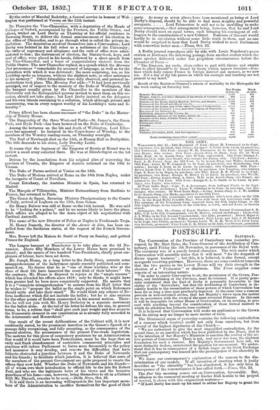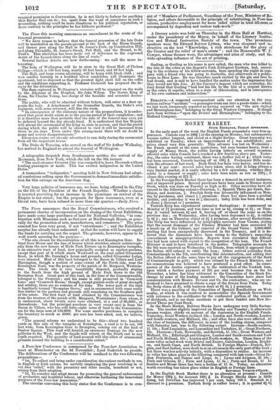POSTSCRIPT.
SATURDAY.
The Convocation of the Province of Canterbury was yesterday pro- rogued, by Mr. Hart Dyke, the Vicar-General of the Archbishop of Can- terbury, until Friday the 5th November, in pursuance of the Royal writ. The ceremony was of a purely formal character. The writ under which Convocation will assemble states that it will meet " for the despatch of divers urgent business" ; but this, it is believed, is also formal, except as regards receiving petitions. However, there are some confident rumours that the two parties in the Lower House will try their strength in the election of a " Prolocutor" or chairman. The Times supplies some reports of an interesting nature. "In order to enable Convocation to sit, the permission of the Crown, Pre- mier, and Archbishop of the Province, must be obtained. It is pretty gene- rally understood that the Earl of Derby is personally favourable to the claims of the 'Revivalists,' but that the Archbishop of Canterbury is de- cidedly hostile to the resuscitation of those powers of whiuh Convocation has been Mr so long a time past practically deprived. At the same time a rumour prevails in well-informed circles, that her Majesty's views upon the matter are in accordance with the views of the most reverend Primate. In this ease it will be impossible for either House of Convocation, on its meeting, to pro- ceed with anything beyond the consideration of those formal matters to which its attention has hitherto been confined."
It is believed that Convocation will make an application to the Crown that its sitting may no longer be more matter of form.
The Ministerial organ of yesterday contains the following contradiction of a rumour which received credit not only from ourselves, but from several of the highest dignitaries of the Church-
" We are authorized to give the most unqualified contradiction, for the second time, to an assertion which has been published by the Times, that it is the intention of her Majesty's Ministers to sanction the revival of the ac- tive powers of Convocation. There is not and never has been, tho slightest foundation for such a rumour. Her Majesty's Government have not, we moat distinctly declare, entertained the question for one moment. We under- stand that it was in consequence of a foolish wager on the Stock Exchange that our contemporary was hoaxed into the promulgation of the absurdity in question." We leave our contemporary's explanation of the rumour to the dis- crimination of our readers. If all intention of enacting what it justly describes as "the absurdity" has been abandoned, it has only been in consequence of the remonstrances it has called forth.—Times, Oct. 23. The Poet this morning comes out on Convocation, favourably. But, in allusion to the rumoured meeting at Exeter Hall hostile to the project of revival, it closes with this enigmatical sentence-
" If Lord Derby has made up his mind to advise her Majesty to grant the required permission to Convocation, he is not likely to forbear for anything that Exeter Hall can do ,• for, apart from the want of conscience in such a proceeding, nothing could be more disastrous to his political reputation, or more contrary to the principles he has hitherto professed." •



























 Previous page
Previous page